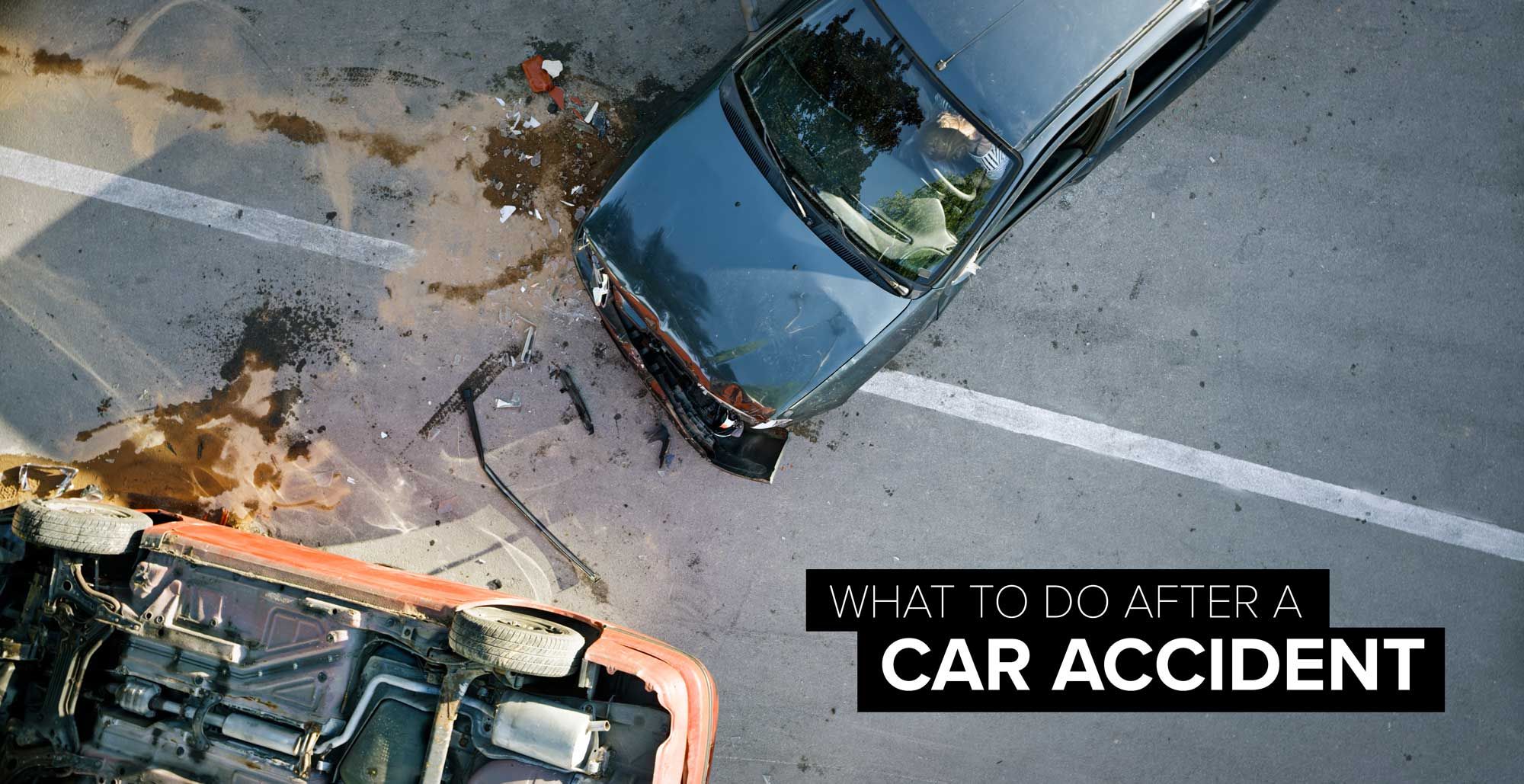
What To Do After a Car Accident: Essential Steps to Take
A car accident can be stressful. Knowing what do after a car accident is essential. This guide covers the steps you need to take, from ensuring safety to handling insurance claims.
Key Takeaways
Ensuring safety and contacting emergency services immediately after a car accident are the foremost steps to take, ensuring that all involved receive necessary medical aid and avoiding further harm.
Exchanging information with other parties involved, documenting the accident scene comprehensively, and promptly notifying your insurance company are critical actions to facilitate a smoother insurance claim process.
Understanding the insurance claims process, your rights during disputes, and how to handle potential disagreements or fraud can significantly impact the efficiency of post-accident recovery and repairs, including managing medical expenses and car repairs.
Ensure Safety First
Safety should be the main concern following any car accident. Begin by checking for injuries among all passengers in your car. If anyone is injured, call emergency services immediately to get medical assistance on the way. If the accident is minor and no one is hurt, carefully drive your car to the side of the road to a safe location. Doing so will avoid exacerbating the situation and safeguard all those concerned.
Once you have moved to a safe location, use hazard lights, road flares, or reflective emergency triangles to alert other drivers. This step is fundamental to avoid further mishaps and alert others about the incident. Remember, your safety and the safety of others should always come first.
In situations where the other driver appears impaired or aggressive, it’s best to remain in your car and avoid any confrontation. Staying calm and composed can help de-escalate potential conflicts, and police intervention may be necessary. Safety considerations extend beyond physical safety to maintaining composure in stressful circumstances.
Contact Emergency Services
Once everyone’s safety is confirmed, the subsequent vital move is to reach out to emergency services. Dial 911 to report the accident and request medical assistance if needed. Reporting all accidents to the police, irrespective of their perceived severity, is vital. A formal police report is indispensable for filing insurance claims and may serve as critical evidence in potential legal proceedings.
If you’re within city limits, call the local police. Outside city limits, contact the highway patrol or county sheriff’s department. Providing accurate details about the location of the accident will ensure that help arrives promptly. Bear in mind, possessing a police report can considerably ease the insurance claim process, making it an unskippable step.
Exchange Information with Other Parties
Once emergency services are on their way, take the time to exchange information with the other parties involved in the accident. Collect the full name and contact information of the other driver, as well as their insurance company and policy number. This data is critical for processing insurance claims and holding all parties responsible.
In addition to insurance information, gather the following details about the vehicles involved:
Driver’s license number
License plate number and vehicle registration
Details about the vehicle such as its type, color, and model
Contact information of any witnesses
Having comprehensive details will support your case during the insurance claim process and help clarify the events that led to the accident.
Document the Scene of the Accident
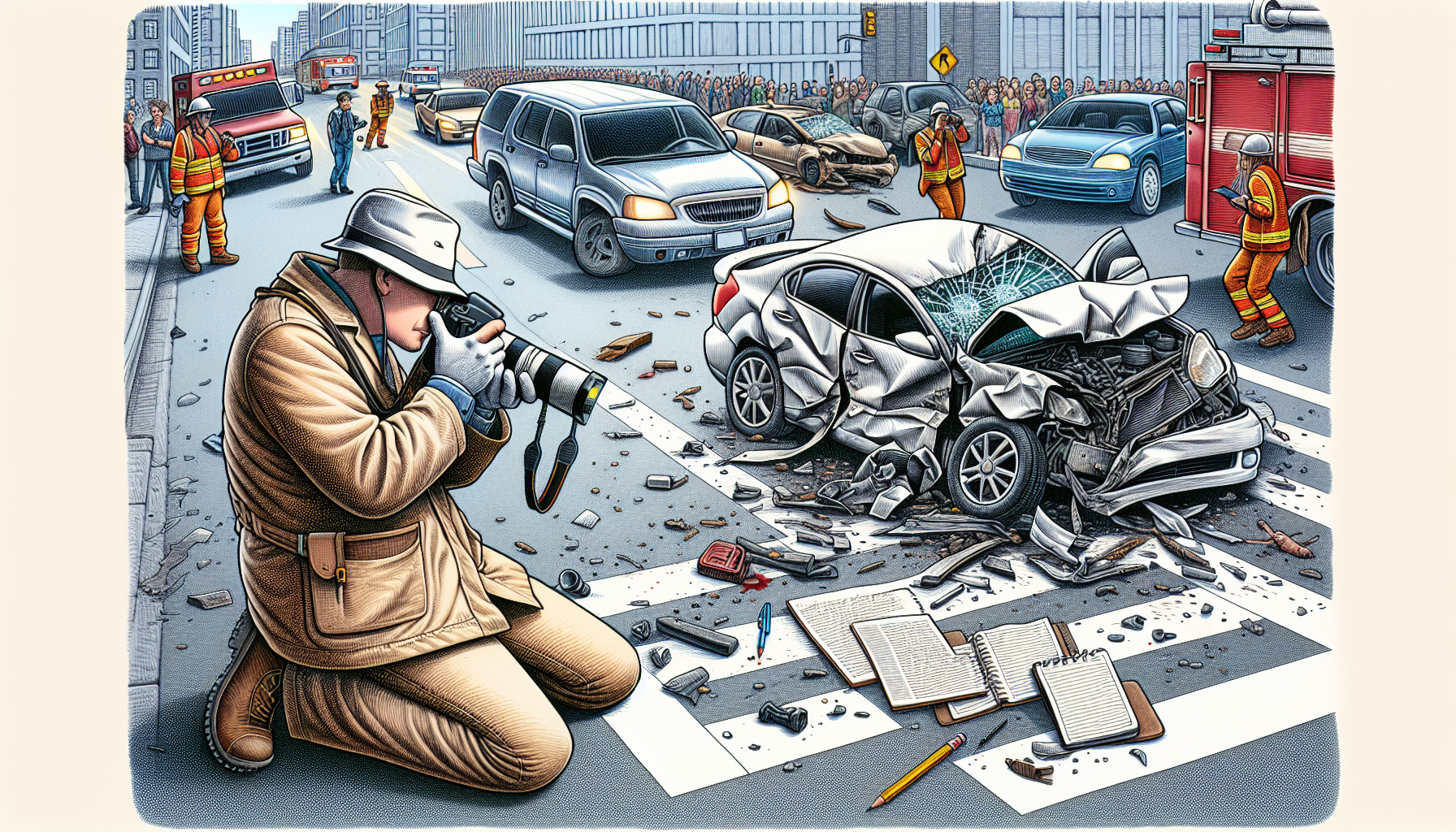
Comprehensive documentation of the accident scene is another significant step. Utilize your smartphone to capture pictures and videos of the damage to the vehicles, both externally and internally. Capture the positions of the vehicles, nearby landmarks, street signs, and any debris such as vehicle parts or tree limbs. This visual evidence can be invaluable when filing an insurance claim.
Make sure to note the following information:
Time and date of the accident
Exact location, including street names and direction of the vehicles
Contact information from any witnesses present at the scene
Use your smartphone’s camera to capture street names and the direction of the vehicles. These particulars are key to depicting the incident accurately during the claim report.
Record any additional conditions such as weather, road conditions, and your driving speed. Note down any personal observations about what happened leading up to the accident. These can be dictated using a voice memo app for convenience. Comprehensive documentation will strengthen your position during the insurance claim process and help establish an accurate account of the incident.
Notify Your Insurance Company
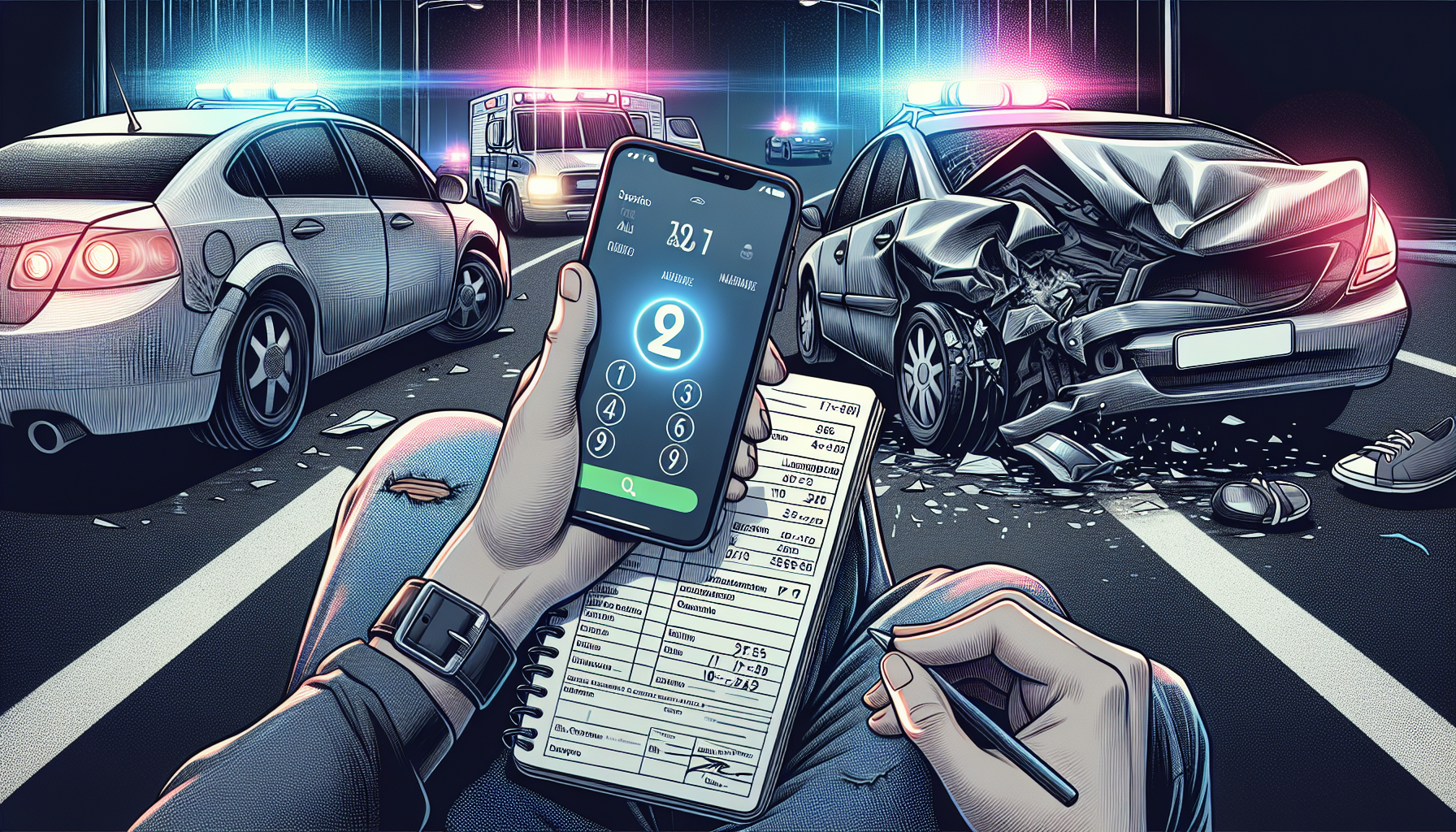
After documenting the scene and verifying everyone’s safety, swiftly inform your insurance company about the accident. Contacting your insurer as soon as possible helps avoid any negative consequences or penalties. Furnish them with required details like your policy number, the accident’s date and time, and the driver’s license numbers of the involved parties.
While reporting the accident, follow these steps:
Disclose only the necessary details and avoid giving unnecessary or unsolicited information.
Your insurance company will guide you through the next steps and may offer virtual tools such as a mobile phone app to begin the claims process online.
Keep in mind, honesty and timeliness are fundamental to a hassle-free insurance claim process.
Understanding the Claims Process
While the insurance claim process can be intricate, comprehending it aids in securing the coverage you rightfully deserve. The claims process involves:
Fault determination, which can influence the outcome of your claim.
An insurance adjuster will evaluate the damage, determine fault, and assess repair costs or total loss.
If the cost to repair your vehicle equals or exceeds 75% of its actual cash value, it may be considered a total loss.
Insurance adjusters also decide whether aftermarket parts or original manufacturer parts will be used for repairs. Grasping these facets of the claims process will empower you to make educated decisions and brace for possible hurdles.
What Happens After Filing a Claim
Upon filing a claim, the insurance company initiates an investigation involving a car inspection and examination of all accessible evidence. An insurance agent, acting as an adjuster or appraiser, will inspect the vehicle damage and write an estimate. They may also re-inspect additional damages if necessary. The adjuster’s role is to determine who is at fault in the accident, using vehicle inspections, information provided by the parties involved, and supporting documentation.
If the accident wasn’t your fault, you will need to file a claim with the at-fault driver’s insurance company. However, if you file a claim with your own insurance under collision coverage, you will usually need to pay a deductible.
Apprehending these steps will aid in managing the claims process more efficiently.
Getting Your Vehicle Repaired
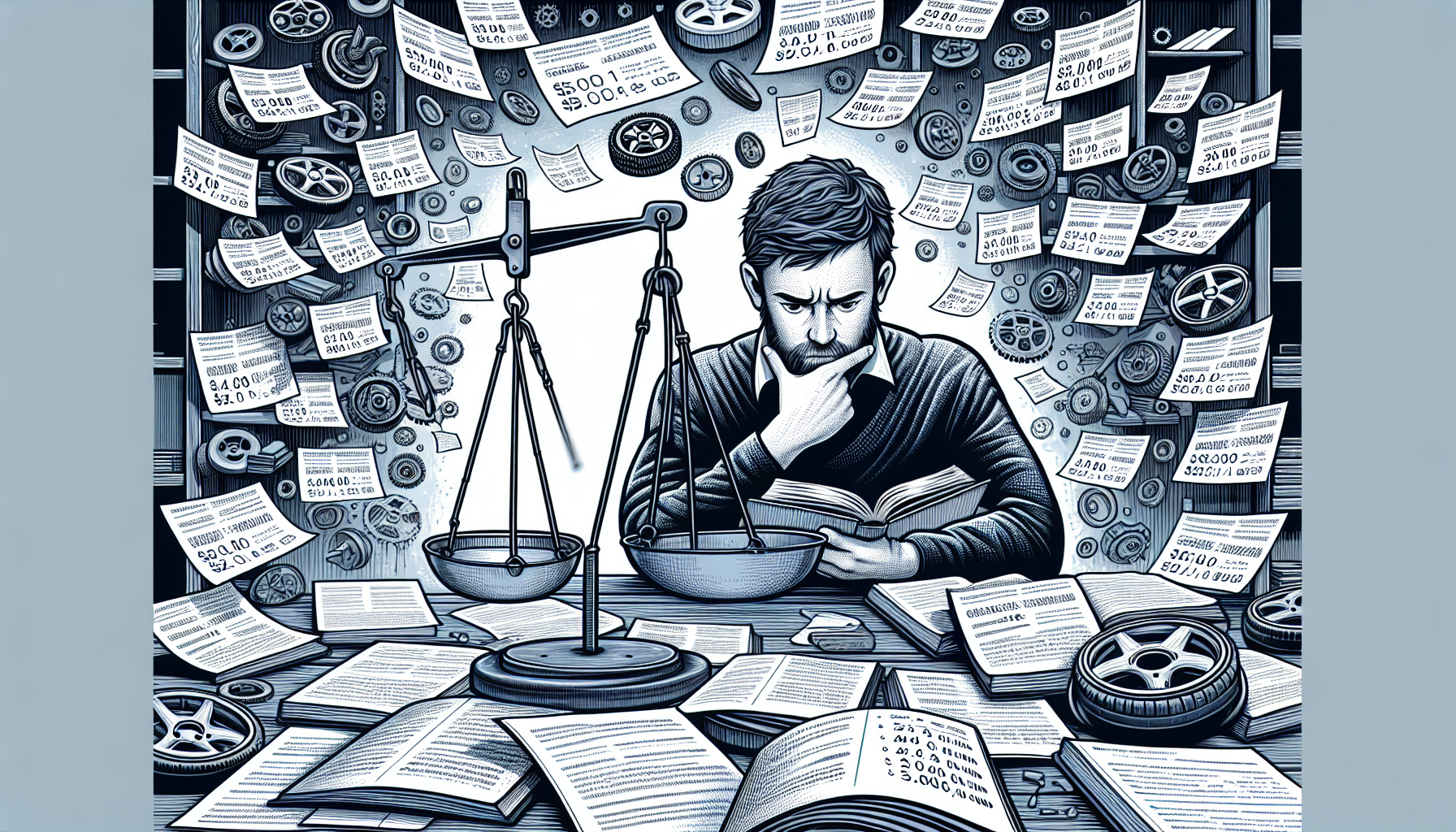
Following the insurance claims procedure, the subsequent move is to get your vehicle fixed. You are entitled to select your preferred auto repair shop, regardless of any recommendations made by your insurance company. It is important to exercise your right to choose the best option for your vehicle repairs. It’s advisable to get multiple repair estimates to compare costs, but be cautious of choosing the cheapest option, as it may not offer the highest quality repairs.
Your insurance policy may specify whether aftermarket or OEM parts must be used for repairs. Leases often require OEM parts, so it’s essential to understand your policy’s requirements. The repair process typically involves:
Estimate
Insurance approval
Dropoff
Disassembly
Ordering parts
Repairs
Painting
Reassembly
Detailing
Final inspection
Auto repair shops often handle all insurance communications, from initial estimates to final billing, working closely with auto insurance companies. You can also request to be notified if new damage is discovered during repairs to avoid surprises on the final invoice. Staying well-versed about the repair process guarantees that your vehicle is restored to its state prior to the accident.
Handling Medical Expenses
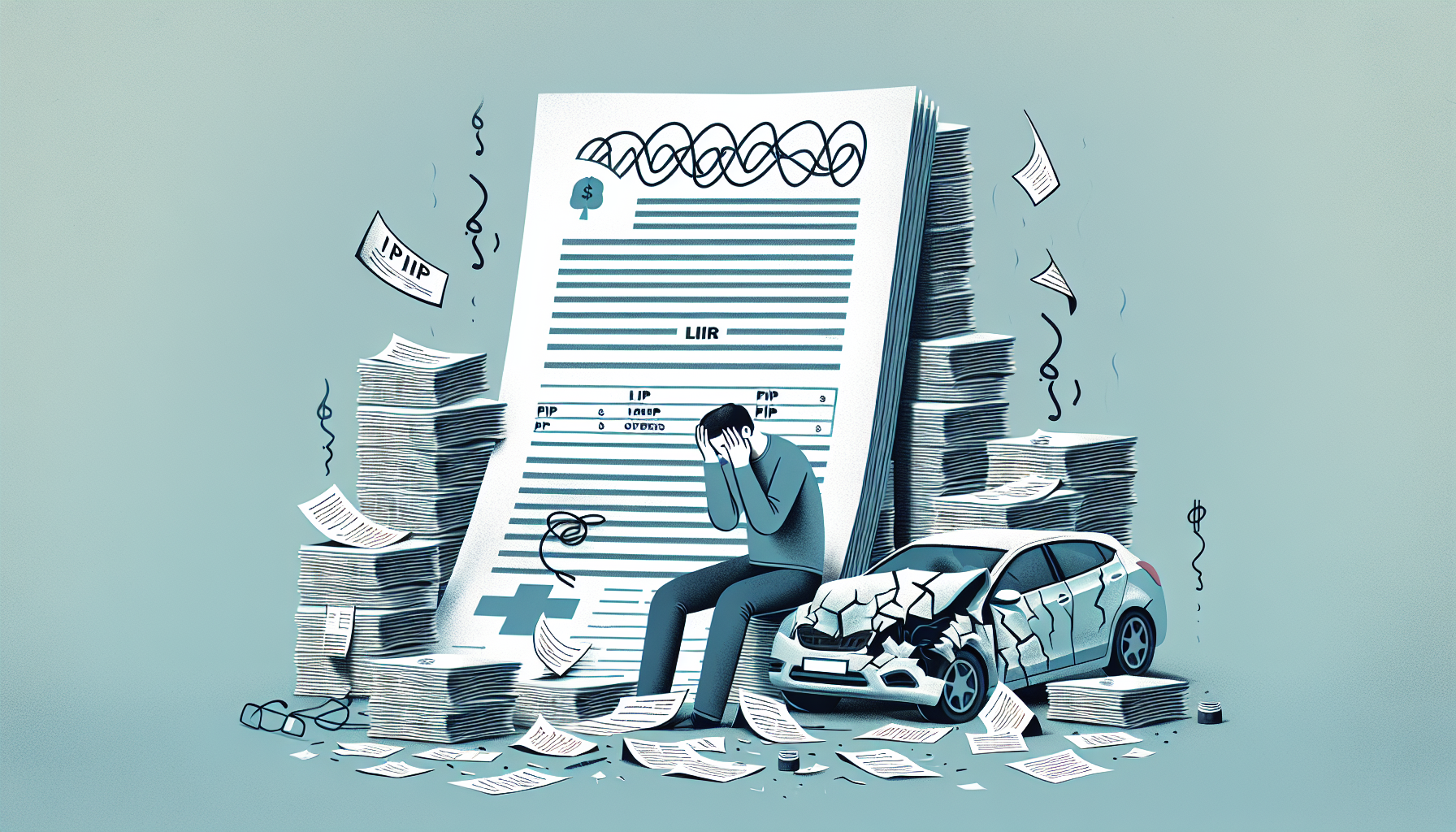
Managing medical expenses post a car accident can be challenging, however, comprehension of your insurance coverage can simplify the process. Personal injury protection (PIP) covers medical expenses and additional costs like lost wages or child care if you’re injured in a car accident. PIP coverage is available in no-fault states, while medical payments coverage is typically offered in states that aren’t no-fault.
Medical payments coverage helps pay for medical expenses for you or your passengers if you’re injured in a car accident, regardless of fault. This coverage is usually optional and not available in all states. Additionally, auto liability coverage, required by law in most states, helps pay for the other party’s medical expenses if you cause an accident. Recognizing these coverages will assist in handling medical expenses efficiently.
Dealing with Disagreements
Disagreements with insurance adjusters can arise due to various reasons such as:
Insufficient payout
Fault disputes
Undervalued vehicle
Denied claim
Inadequate coverage
Personal injury compensation
Disputed liability
In the face of such disagreements, amassing evidence like accident scene documentation, medical records, and repair estimates becomes pivotal.
Thoroughly reviewing your insurance policy helps understand your coverage and rights during a dispute. Mediation and arbitration are alternative dispute resolution methods that can help resolve disagreements with an insurance company. If you and your insurance company cannot agree on the amount to be paid for collision or other than collision coverage, use the appraisal provision of the policy and select competent appraisers.
Legal action may be necessary if negotiations with the insurance company fail to produce a fair settlement. Seek legal advice if you cannot agree on the value of your claim with the insurance company. Filing a complaint with the insurance company or regulatory authorities is also an option if you cannot reach an agreement. Being proactive and informed will help you navigate disputes effectively.
Rental Car and Transportation Options
If your car is under repair, leveraging rental reimbursement coverage can aid in covering the cost of a rental vehicle. Confirming rental bookings through your insurance can often involve direct billing to the insurance company, reducing hassle. This ensures that you have a replacement vehicle while your car is being repaired.
When renting a car after an accident, it’s important to bring documentation such as your driver’s license, credit card, and insurance information. If you don’t have rental reimbursement coverage, some rental agencies may offer special rates for replacement vehicles after an accident. Ensuring you have the necessary documentation will make the rental process smoother.
How to Protect Yourself Against Fraud
Guarding yourself against fraud becomes imperative following a car accident. Here are some tips to help you avoid fraud:
Be cautious with the information you disclose and verify credentials.
Watch out for vehicles that intentionally pull in front to cause a collision.
Beware of bandit tow trucks that may try to scam victims by offering help and subsequently holding the vehicle hostage for an unreasonable payout.
To prevent theft and misuse of your insurance information, follow these steps:
Store your insurance information securely.
Avoid signing blank insurance forms to prevent unauthorized charges.
Request detailed bills for repair and medical services to verify their accuracy.
Report any suspected fraud to the authorities promptly.
Adopting these precautions will aid in shielding you from fraudulent activities.
Potential Impact on Car Insurance Rates
Participation in a car accident can influence your car insurance rates. Here are some things to keep in mind:
Car insurance premiums can increase by 20–25% if you are at fault and someone is injured.
However, insurance premiums might not increase if the accident is your first or you were not at fault.
Accident forgiveness programs can prevent premium increases after the first accident but may not apply if switching insurers.
Comprehending the possible effect on your car insurance rates will assist you in making knowledgeable decisions and potentially pursue accident forgiveness programs to alleviate any premium escalations.
Summary
In summary, knowing what steps to take after a car accident is crucial for ensuring safety, protecting your rights, and navigating the insurance claim process. From ensuring safety and contacting emergency services to documenting the scene and notifying your insurance company, each step plays a vital role in managing the aftermath of an accident effectively.
By staying informed and prepared, you can handle the challenges that come with car accidents more confidently. Remember, being proactive and understanding your insurance policy can make a significant difference in the outcome of your claims and overall experience.
Frequently Asked Questions
What should I do immediately after a car accident?
After a car accident, ensure safety first by checking for injuries, moving to a safe location, and using hazard lights to alert other drivers. Remain calm throughout the process.
Why is it important to contact emergency services even for minor accidents?
It’s important to contact emergency services for even minor accidents because it ensures medical assistance is available if needed and provides an official police report, crucial for insurance claims.
What information should I exchange with the other driver?
You should exchange full names, contact information, insurance details, driver’s license numbers, and vehicle information such as type, color, and model with the other driver involved in the accident. This will ensure that both parties have the necessary information for any insurance claims or legal proceedings.
How can I protect myself against fraud after a car accident?
To protect yourself against fraud after a car accident, be cautious with the information you share, verify credentials, store insurance information securely, and report any suspected fraud as soon as possible.
How can a car accident impact my insurance rates?
Being at fault in a car accident can lead to a 20-25% increase in insurance premiums, but some programs offer accident forgiveness for the first accident, preventing a rate increase.